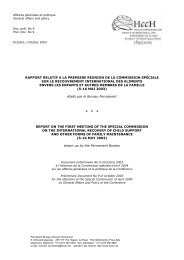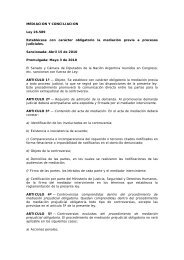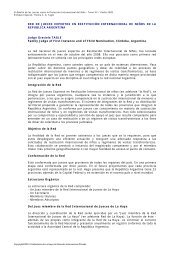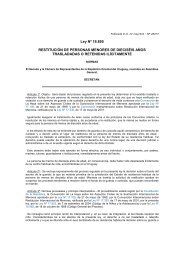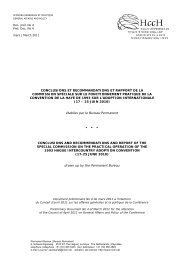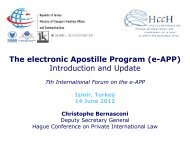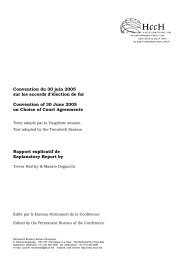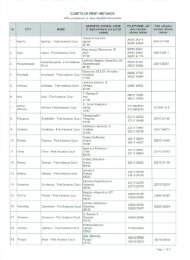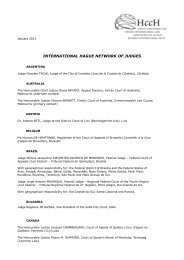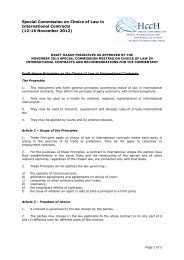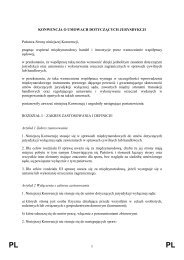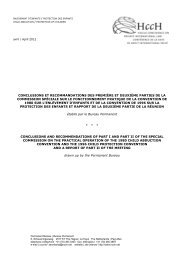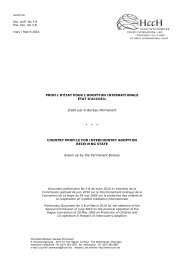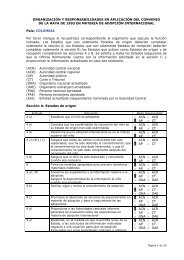aperçu des réponses au questionnaire accompagnant la ... - HCCH
aperçu des réponses au questionnaire accompagnant la ... - HCCH
aperçu des réponses au questionnaire accompagnant la ... - HCCH
Create successful ePaper yourself
Turn your PDF publications into a flip-book with our unique Google optimized e-Paper software.
Question Réponse / Reply État / State<br />
précise [...]. Alberta : Oui, une cour pourrait juger qu'il est contraire à <strong>la</strong> politique officielle d'exécuter un tel<br />
jugement étranger. Il est difficile de prédire les circonstances [...] mais on pense que ce<strong>la</strong> pourrait se produire<br />
lorsque <strong>la</strong> créance qu'on veut faire exécuter est une créance illégale en vertu du droit canadien, par exemple une<br />
créance décou<strong>la</strong>nt d'une servitude.<br />
[E] Québec: Under art. 3155, (3) C.C.Q., “A Quebec <strong>au</strong>thority recognizes and, where applicable, dec<strong>la</strong>res<br />
enforceable any decision rendered outside Quebec except in the following cases: … (3) the decision was rendered in<br />
contravention of the fundamental principles of procedure”. Note also art. 3156 C.C.Q., which provi<strong>des</strong>: “A<br />
decision rendered by def<strong>au</strong>lt may not be recognized or dec<strong>la</strong>red enforceable unless the p<strong>la</strong>intiff proves that the act of<br />
procedure initiating the proceedings was duly served on the def<strong>au</strong>lting party in accordance with the <strong>la</strong>w of<br />
the p<strong>la</strong>ce where the decision was rendered. However, the <strong>au</strong>thority may refuse recognition or enforcement<br />
if the def<strong>au</strong>lting party proves that, owing to the circumstances, he was unable to learn of the act of procedure<br />
initiating the proceedings or was not given sufficient time to offer his defence. There has not yet been any<br />
expression of opinion in the judicial decisions on this specific issue of a refusal to enforce a foreign judgment where<br />
service has been made in accordance with the methods provided for in the Convention. Alberta: Yes, a Court might<br />
find that it is contrary to public policy to enforce such a foreign judgement. It is difficult to predict what<br />
circumstances [...] but it is suspected that this might occur where the debt sought to be enforced is an illegal one<br />
under Canadian <strong>la</strong>w, e.g. a debt re<strong>la</strong>ted to indentured servitude.<br />
Under section 6(1)(a)(iii) of the Foreign Judgments (Reciprocal Enforcement) Ordinance, Chapter 319 of the Laws of<br />
Hong Kong, the court shall refuse to register a judgment for enforcement if, inter alia, it is satisfied that the<br />
defendant did not (notwithstanding that process may have been duly served on him in accordance with the <strong>la</strong>w of<br />
the country of the original court) receive notice of those proceedings in sufficient time to enable him to defend the<br />
proceedings and did not appear. Therefore, service may have been performed in compliance with the Convention,<br />
but the court is still entitled to take everything into consideration to decide whether or not the defendant has<br />
sufficient time to enable him to defend the proceedings if he did not appear in the proceedings in the original court.<br />
Furthermore, section 6(1)(a)(v) of the same Ordinance provi<strong>des</strong> for a mandatory ground of refusal to enforce a<br />
foreign judgment based on public policy. Our position on trans<strong>la</strong>tion is clear as represented by Order 69 rule 3(1) of<br />
the Rules of the High Court. But if the <strong>la</strong>ck of trans<strong>la</strong>tion of the relevant documents is considered to have<br />
fundamentally affected the rights of the defendant to have a fair trial, the resulting judgment may not<br />
be enforced in Hong Kong by virtue of this section.<br />
The principal constraint as to the effectiveness of a foreign judgment is that the defendant against whom the<br />
judgment is to be enforced, has been accorded appropriate due process, including notice and an opportunity to<br />
respond. Where the service of process has been made under the Convention consistent with the domestic <strong>la</strong>ws and<br />
court procedures, courts would typically consider the service effective. This does not preclude a judgment<br />
defendant from <strong>la</strong>ter challenging the judgment based upon some factual infirmity in the service not<br />
otherwise apparent to the court. Thus, for example, if the addressee accepts mail service of an untrans<strong>la</strong>ted<br />
pleading or document, a U.S. court could still find, if challenged, that the defendant had not been provided<br />
reasonable due process and deny enforcement of a resulting judgment. However, there are no reported cases of<br />
this happening, in fact. In addition, of course, other procedural or substantive infirmities may exist in the underlying<br />
action that might the judgment also unenforceable.<br />
Chine (Hongkong)<br />
Etats-Unis<br />
No enforcement for judgement vio<strong>la</strong>ting public order. Koweït<br />
It would be possible, that Polish court might deny enforcement of a foreign judgement on the grounds that the<br />
service has not been trans<strong>la</strong>ted, even though the service has been performed by the methods provided for under<br />
Convention. The grounds of that refusal would not be the breach of public policy but the depriving of the right of<br />
defence - if the addressee would not know the <strong>la</strong>nguage in which document would be drawn up.<br />
Pologne<br />
Page 48 of 69



